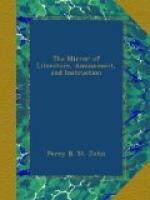In the course of this vitally important and deeply-interesting subject of inquiry, it is not my intention to enter into any metaphysical discussion respecting the inscrutable and mysterious union existing between matter and mind, or to endeavour to point out the manner in which the body influences the mind, and the mind the body. Such subjects we do not think to be legitimate objects of inquiry. The medical philosopher is engaged in less obscure and less uncertain researches; he does not attempt to solve the question regarding the intimate union subsisting between the natural and intellectual portions of our nature, but he wisely confines himself to an attentive examination of the phenomena which result from that union. Man is compounded of a soul and body, so closely united, not identified, that they frequently struggle and occasionally overpower each other. Sometimes the mind ascends the throne and subdues, in a moment, the physical energies of the most powerful of her subjects. At other times the body gains the ascendency, and lays prostrate before her the mightiest of human intellects. Instances illustrative of both propositions are of daily occurrence. It has been said of Sophocles, that being desirous of proving that at an advanced age he was in full possession of his intellectual faculties, he composed a tragedy, was crowned, and died through joy. The same thing happened to Philippides, the comic writer. M. Juventius Thalma, on being told that a triumph had been decreed to him for having subdued Corsica, fell down dead before the altar at which he was offering up his thanksgiving. Zimmerman, in his work on Experience in Physic, has related the circumstance of a worthy family in Holland being reduced to indigence; the elder brother passed over to the East Indies, acquired considerable fortune there, and returning home presented his sister with the richest jewel: the young woman, at this unexpected change of fortune became motionless and died. The famous Forquet died on being told that Louis XIV. had restored him to his liberty. It is also related of Diodorus Chronos, who was considered as the most subtle logician of the time of Ptolemy Soter, that Stilbo one day in the presence of the king, proposed a question to him, to which he was unable to reply. The king, willing to cover him with shame, pronounced only one part of his name, and called him ovos, ass, instead of Chronos. Diodorus was so much affected at this as to die soon afterwards.
Perhaps there is not a more remarkable instance on record showing, in a melancholy though forcible light, the dominion of mind over the material frame, than the circumstances which attended the death of John Hunter. This distinguished surgeon and physiologist died in a fit of enraged passion; and, what is somewhat extraordinary, he had often predicted that such excitement would prove fatal to him. He died at St. George’s Hospital, Oct. 16, 1793, under these circumstances:




